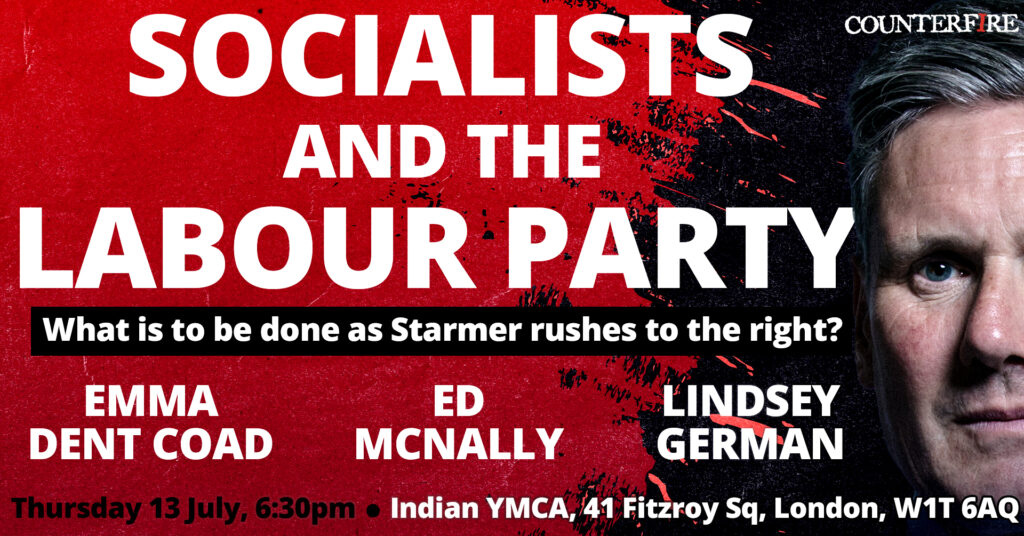 Sir Keir in 2017. Photo: Flickr/Chatham House
Sir Keir in 2017. Photo: Flickr/Chatham House
Lindsey German on Sir Keir, the establishment’s friend, and the unravelling of Spycops
The fate of Thames Water should be the end of the privatisation model pioneered by Thatcher in the 1980s. The major utilities and public companies were sold off at undervalued prices, their shares rapidly snapped up by big corporations and investors, prices for consumers rose rapidly, and profits went to shareholders, not to investment. That’s why today the common refrain about most parts of public life in Britain is that nothing works. And it is epitomised by Thames Water drowning in debt and likely to be taken back into public ownership temporarily.
But any form of nationalisation is going to be resisted to the bitter end, not just by the greedy privatised companies themselves, but by the Tories and the increasingly right-wing Labour Party under Keir Starmer. The cheek of the privatised companies was illustrated when the head of another, Severn Trent, convened a meeting of all the water firms to explicitly discuss ways of resisting nationalisation. And it’s no use going to the supposed regulators for help. As the Observer reported, ‘27 former Ofwat directors, managers and consultants [are] working in the industry they helped to regulate, with about half in senior posts.’ So a number of those regulating the industry have moved over to take lucrative positions in…. the privatised water companies.
While investors take the money and run, working class people are left with dire and expensive services that fail frequently because there is no investment. The water companies are publicly disgraced because of their dumping of sewage in rivers and seas, rather than invest in new treatment plants. But in London (and no doubt elsewhere) there have been several burst water mains, risking lives as they cause disruption sometimes for months, because of lack of investment. In the southeast of England, drinking water supplies have failed ‘because of the hot weather’, in what must be the lamest excuse from a company supposed to provide just that.
The answer from government and industry alike is that future investment will have to be paid for by us, through much higher bills and higher taxes. Already gas and electricity is beyond affordable for millions. But the energy companies will set the benchmark for other industries as profits are protected. No wonder nearly 13 million adults struggle to pay bills.
At the same time wages are being deliberately held down, with successive groups of workers having to go into battle to prevent their incomes falling even lower. The lie that their wages are causing inflation is used as justification, when in reality the profit gouging by hugely wealthy companies, and consumption of some of the wealthiest people, are contributing to rising prices.
Labour should at least be standing up for working-class people. Instead, Keir Starmer is moving in the opposite direction. He has long since abandoned most of the principles on which he stood for election as Jeremy Corbyn’s successor. These dumped policies include higher income tax for the rich, nationalisation of mail, energy and water, ending NHS outsourcing, abolition of student tuition fees, and supporting free movement. Recent further retreats include abandoning plans for rent controls, refusing to commit to any renationalisation, not supporting the very many groups of public sector workers on strike. He is so far also refusing to back free school meals, even though millions of children are going hungry, and may continue to back the ‘two child’ policy for universal credit, even though this is leading to increased poverty and mental health concerns. He is driving out left wing Labour supporters, refusing to allow them to stand for election, and expelling them on the most trivial excuse.
The ruling class and its media is urging even more caution on the part of Starmer. They know that the Tories are on their last legs, internally divided, unable to win an election, and riddled with corruption. They know that a Starmer government will be under huge pressure to increase both the standards of public services, and the incomes of working-class people. So they are determined to ensure now that he makes no promises that might shift the balance of wealth and power towards those who produce the wealth. They want Starmer to promise nothing and concede even less.
British capitalism is in deep crisis, slipping down comparative league tables with its competitors on a whole range of issues from wage levels and living standards, to poverty and child hunger, to health standards and care. To put in place even the very modest proposals in Starmer’s original platform would mean challenging those pillars of the British economy today, finance and the military. There is no question of the ruling class doing so. Its alternative is to impose much harder medicine on British workers than anything we have seen so far – charges for healthcare, lower wages, higher utility prices, worsening public services, and a housing sector increasingly unaffordable for nearly everyone.
That’s what we are resisting when we support the strikes. They are not just about the immediate pay rises and improved conditions for the workers concerned but about preserving decent healthcare, education and transport. They are about standing up to the dictates of capital and demanding a bigger share of wealth for the majority. Everyone should support the teachers, junior doctors, Amazon workers, St Mungo’s workers, who are taking action for this reason. We should be in no doubt what Starmer will do when in office – and he will only change his mind under the pressure that working class people going on strike and fighting for their rights can bring to bear.
Government and employers want to sit out the strikes until they are defeated. Our job should be to escalate, to draw in ever wider groups of workers, to build solidarity, to link up the different struggles, and to ensure that we win. Because let’s face it, the struggle is not just going to be against the Tories, but the Labour leadership as well.
Secrets, lies and Spycops
The interim report into the Spycops affair from the Mitting inquiry is a vindication of all those who challenged undercover policing by the Metropolitan force through their Special Demonstration Squad (SDS). The evidence is a catalogue of political policing: left wing activists fighting fascism, apartheid, for women’s rights, trade union rights, were spied on, lied to, had their privacy invaded, were coerced into sexual relationships based on a lie, were blacklisted and lost jobs. The language used by the police in their reports reeked of sexism, racism and homophobia – all issues they are still accused of today.
I was one of the non-state core participants in the inquiry, which covered from 1968 to the early 80s, and will be in the next two stages, given that the state has been spying on me for the best part of five decades. I gave my initial responses here but it’s worth noting that Mitting himself said the SDS should have been disbanded very early on. It’s also worth considering the politics behind this policing. It was aimed at left wing activists, not at the far right. Indeed, the far right was deemed too dangerous to infiltrate, a tacit recognition that the left activists were engaged in campaigning, not cloak and dagger or terrorist activities.
In the late 1970s especially, when the National Front had considerable support, right wing and fascist involvement in racist murders, attacks on ethnic minorities and anti-fascists, a virtual pogrom in East London’s Brick Lane, were well known. The Anti-Nazi League was a hugely important challenge to this racism. Yet it was the anti-fascists and socialists who were persecuted, not the right. Trade unionists blacklisted, especially in the construction industry, found it very hard to get work. The employers were aided and abetted by the SDS. Those fighting in support of national liberation movements and against apartheid also found themselves targeted.
It was the most appalling political and personal intrusion, sanctioned and paid for by the state. In my case, as an organiser and editor for IS and then the SWP, two of those now known to be spies worked in the national office at different times, gaining details of names and bank accounts, posing as friends and comrades, finding out all sorts of things that would have never been shared to the police. A particular intrusion was over the murder of Blair Peach, a gently spoken socialist teacher, killed by police at a demo against fascists in Southall. His funeral was spied on by the police, as was a march in his memory the following year, when large numbers of demonstrators, many of them friends, family or comrades were also listed in SDS reports.
Finally it’s worth noting this went on under successive governments, Labour and Tory. Some of the secretive and unjustified methods are now coming out, but by no means all. The slow drip of information, the redaction of names, the fact that even now we can’t know the real identities of those who spied on us, speak of a secret stae which is determined to keep us in the dark, and to do everything it can to hinder left wing movements. And it continues regardless of who is nominally in government. We should have access to all these files, and the spying operations should be ended. We have to keep exposing these operations, as so many have done, and keep campaigning so that they don’t succeed.
This week: I will be supporting the teachers’ strike this Wednesday as they demonstrate by surrounding parliament. I’m hoping to take the narrowboat Henry Marten out for its first voyage after painting by the weekend. I’ve ordered Nigel Flanagan’s new book Our Trade Unions to read over the journey.
Lindsey German will be speaking on a panel with Emma Dent Coad and Ed McNally on Socialists and Labour: What is to be done as Starmer rushes to the right? on 13 July in London

Fund the fightback
We urgently need stronger socialist organisation to push for the widest possible resistance and put the case for change. Please donate generously to this year’s Counterfire appeal and help us meet our £25,000 target as fast as possible.

